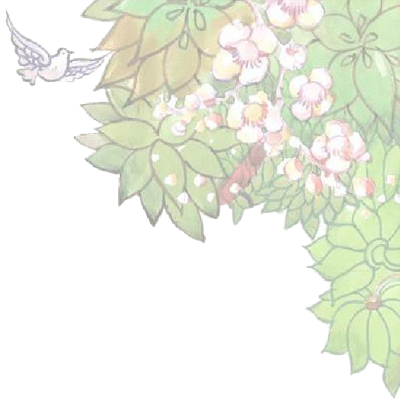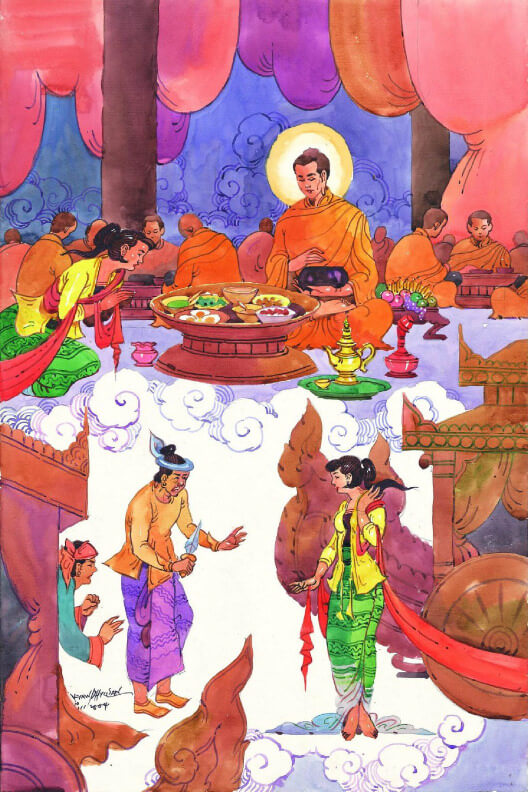66話 アンバパーリー ・・・・ 阿羅漢になった遊女

第6部 入滅へ
第1章 ブッダ最後の旅
66話 アンバパーリー ・・・・ 阿羅漢になった遊女

ゴータマ・ブッダの在世当時、ヴェーサーリーにブッダの弟子となったひとりの遊女がいた。自然発生的(化生(オーパパーティカ))に彼女は誕生した、といわれた。(訳注:化生は、仏教が想定している出生の四種類=四生のうちの一つで、天界や地獄などで忽然と出生する。他の三生は、母の子宮から生まれる胎生、卵で生まれる卵生、湿った場所で発生する湿生)ある日、ヴェーサーリーで、リッチャヴィー族の王族の庭師が、王園のマンゴー樹の下に、女の子の赤ちゃんが横たわっているのをみつけ、街へつれてきた。その生まれのゆえに、アンバパーリーと名づけられた。パーリ語では「アンバ」にはマンゴー、「パーリー」には線、守る女、の意味がある。
彼女は成長すると、なみはずれて美しく、優雅な女性になった。リッチャヴィー族の王族青年の多くは、彼女との結婚をもとめて、互いに競った。それぞれが自分のものにしたくて、おかげで争いと喧嘩がふえた。最後には、そんな反目に終止符を打つための長い話し合いの後、アンバパーリーは誰も独り占めにするべきではない、と取り決めた。遊女になるようにさせたのである。一方、アンバパーリーは生まれつき善い性格をもっていた。多額の金を慈善活動に費やし、リッチャヴィー族の王族青年たちに落ちつきと気品を及ぼす影響を発揮した。かくて、彼女は事実上、リッチャヴィー貴族共和政の無冠の女王となったのである。
過去世で彼女は、プッサ(報沙)仏の時代に、王侯貴族(カッティヤ)の家の娘として生まれ、功徳を積む善行為をたくさんしたため、それ以降の生まれに果報で美女となった。そしてシキー(尺棄)仏の時代に比丘尼の僧団に入った。
(訳注:ゴータマ・ブッダ出現以前に「過去二十八仏」が現れ、プッサ仏は二十一番目、シキー仏は二十三番目とされる。なお過去二十八仏すべてを網羅した護経(パリッタ)があるほか、ヴィパッシー仏以降の「過去七仏」については、長部14「大譬喩経」で説かれている)
ある日、彼女が僧院で礼拝の行列に加わっていたとき、彼女の正面にいた阿羅漢の比丘尼が、僧院の中庭で急いでつばを吐いた。列のなかでゆっくり歩いていたので、彼女にはそのつばが見えた。それをしたのが誰なのか知らずに、すぐさま、こんな悪口をいってしまったのである。
「ここでつばを吐くなんて、まぁ、何という売女!」
この悪口の結果、彼女は地獄に生まれ変わり、それ以降、遊女となって一万回のあいだ生まれ変わり、いまはその最後の生存なのであった。
アンバパーリーの美しさの評判は、いたるところに広まった。そして彼女のおかげで、ヴェーサーリーはとても繁栄した。この評判を知ってマガダ国のビンビサーラ王は、ラージャガハも美しい遊女によって華を添えるべきである、と考えた。そこで、サーラヴァティーという名の若い乙女に王から命じて遊女にならせ、同じような魅力を生まれさせようとした。
(訳注:ブッダの侍医ジーヴァカは、サーラヴァティーが産んだ父無し子。51話参照)
あるとき、ビンビサーラ王みずからアンバパーリーに会ってみた。ほかの男同様に、彼女の美しさに圧倒され、そのもてなしの悦楽を味わった。この交わりによって、彼女は懐妊した。そして、月が満ちて男の子の赤ちゃんを出産し、ヴィマラ・コンダンニャと名づけられた。
その後に、世尊はナーディカ村に御心のままの長さ、住まわれた後、多数の比丘をともない、ヴェーサーリーへ向かわれ、アンバパーリーのマンゴー林に滞在されたのであった。彼女が訪ねてくるであろう、と予期されて、世尊は、随行している若い比丘たちに、正念と正知の状態でいつづけるように、と指示を与えた。世尊は四念処を教えられたのである。
世尊がヴェーサーリーに来られていて、自分のマンゴー林に滞在されている、ときいて、遊女アンバパーリーは、多数の馬車に引き具を付けさせた。彼女は馬車のひとつに乗り、ヴェーサーリーから彼女自身のマンゴー林に向けて、馬車を走らせた。馬車で行けるところまで行って、彼女は馬車から降り、歩いて世尊のもとへ近づいて行った。世尊に敬礼し、適切なところに坐った。
世尊はそれから彼女に、法(ダンマ)の功徳を吹き込み、法(ダンマ)の実践を説き示し、法(ダンマ)の実践を促し、励まし、その喜びを感じさせた。説法の終わりに、彼女は強く心を動かされ、法(ダンマ)に高揚して、世尊を、このように招待した。
「尊師よ、わたしの布施食の招待を、どうぞ、世尊があす、比丘僧団とともにお受けくださいますように」
世尊は、沈黙のうちに同意された。アンバパーリーは座から立ち、世尊に礼拝後、右回りをたもって退出した。
リッチャヴィー族の王族青年たちは、世尊がヴェーサーリーに到着され、アンバパーリーのマンゴー林に滞在されている、ときいて、かれらの最上の馬車に乗り、街を出た。そのうち、ある者らは青色で身なりをまとめ、青い衣装、青の飾りをまとい、青色で飾り立てた馬が引く青い馬車としていた。青一色の外観にしたのである。また、ある者らは黄一色の外観に、別の者らは赤一色に、さらに、白一色とした者らもいた。
行く途上で、リッチャヴィー族の王族青年たちはアンバパーリーと出会った。彼女は、自分の最上の馬車で、急いで去ろうとしているところであった。王族青年たちのもろもろの馬車が、彼女の馬車と衝突し、車軸と車軸、車輪と車輪、馬の首の後ろにかける軛と軛が、ぶつかったのである。すると、その後すぐに、リッチャヴィー族の王族青年たちは彼女に、こういった。
「よく見ろ、アンバパーリー! なぜ、おまえは、おまえの馬車を、リッチャヴィー族の王族青年のもろもろの馬車に、車軸と車軸、車輪と車輪、軛と軛で、ぶつけたんだ?」
「おお、王族青年のみなさま! わたしはたったいま、世尊を比丘僧団とともに、あす、布施食に招待したばかりでございますもので」
「それなら、アンバパーリーよ、布施食に招待する特別の栄誉を、われらに十万金でゆずってくれ」
「おお、王族青年のみなさま、たとえ、あなたさま方がわたしに、ヴェーサーリーを領地とともに与えてくださるとしても、わたしは布施食に招待する特別の栄誉を、あなたさま方におゆずりすることはありません」
アンバパーリーの勇ましい答えに、リッチャヴィー族の王族青年たちは指をパチンと弾き、感嘆して叫んだ。
「おお、われらは、このマンゴー娘にやられたぞ! われらは、このマンゴー娘にやられたぞ!」
それからリッチャヴィー族の王族青年たちは、アンバパーリーのマンゴー林へ向かった。向こうからやってくるかれらを世尊がご覧になったとき、世尊は比丘たちに、こう告げられた。
「比丘たちよ、三十三天(ターヴァティンサ)の神々をかつて見たことがない比丘たちに、勢ぞろいしたリッチャヴィー族の者たちを見せてやりなさい。かれらに、リッチャヴィー族の者たちを観察させてやりなさい。かれらに、三十三天の神々とはリッチャヴィー族の者たちのようなのだと、想像させてやりなさい」
リッチャヴィー族の者たちは、馬車で行けるところまで乗って行った。それからかれらは馬車から降り、歩いて世尊のもとへ行った。世尊に敬礼して、適切なところに坐った。世尊はそれからかれらに、法(ダンマ)の功徳を吹き込み、法(ダンマ)の実践を説き示し、法(ダンマ)の実践を促し、励まし、その喜びを感じさせた。説法の終わりには、かれらは強く心を動かされ、法(ダンマ)に高揚して、そしてその後、世尊を、このように招待した。
「尊師よ、われらの布施食の招待を、どうぞ世尊が、あす、比丘僧団とともにお受けくださいますように」
世尊は、こう答えられた。
「リッチャヴィー族の王族青年たちよ、比丘僧団とともに、わたしはあすの布施食の招待を、すでに遊女アンバパーリーから受けているのです」
この後すぐに、リッチャヴィー族の王族青年たちは指をパチンと弾き、感嘆して叫んだ。
「おお、われらは、あのマンゴー娘に一杯食わされたぞ! われらは、あのマンゴー娘にやられたぞ!」
しかしながら、リッチャヴィー族の者たちは、世尊の説法を聴けたことへの感謝と喜びを表明した。それから、かれらは座から立ち、世尊に礼拝後、右回りをたもって退出した。
夜が明けたとき、アンバパーリーは彼女のマンゴー林で、さまざまな種類の豪華な食べ物の準備をしてから、こう告げた。
「時間がまいりました、尊師よ。食事のご用意がととのいました」
世尊と、つきそいの比丘たちが、アンバパーリーの住まいへ行かれて、すでに用意されている席に坐られた。アンバパーリーは世尊と、つきそいの比丘たちをもてなし、彼女手ずから豪華な食べ物をふるまった。食事後、アンバパーリーは一段低い、かたわらの席に坐り、こう申し上げた。
「尊師よ、わたしはこのマンゴー林を、世尊が上首であられる比丘僧団に、寄進させていただきます」
世尊はマンゴー林の寄進を受けられ、そして法(ダンマ)の話を彼女にされた後、席を立たれ、退出された。
アンバパーリーとビンビサーラ王の息子、ヴィマラ・コンダンニャが成長し、あるとき世尊と出会い、世尊の威厳に強い印象を受けた。そのとき、かれは僧団に入り、その後ほどなくして阿羅漢に達した。ある日、アンバパーリーは、息子が法(ダンマ)を説いている、ときいて俗世間を捨てた。そして、比丘尼の僧団に入り、洞察(ヴィパッサナー)の冥想に精進した。老いてゆくみずからの身体を冥想の対象にして、そのはかなさ(無常)と苦へのもろさを観察した。そうすることによって、彼女はいっそう深く存在の本性へ洞察を進め、ほどなく阿羅漢に達した。
たゆみない冥想の実践によって、アンバパーリーは過去世を想起する智慧(宿住智)を得た。彼女は自分の過去世において、たびたび美しい女に生まれたことを見たのだが、肉体の美しさはいつでも萎れ、老化と死によって押しつぶされているのであった。そしていま、彼女の最後の生存で、涅槃の不滅の美しさに彼女は達し、“ブッダのほんとうの娘”だと宣言したのである。
※ 画像やテキストの無断使用はご遠慮ください。/ All rights reserved.

Episode 66 Ambapālī, THE COURTESAN WHO BECAME AN ARAHANT
In the time of the Buddha Gotama, there was a courtesan in Vesālī who became a disciple of the Buddha. She was said to have been born spontaneously (opapātika). One day, the gardener of a Licchavī ruler in Vesālī found a baby girl lying under a mango tree in the king’s garden and brought her to the city. On account of her birth, the baby girl then was named Ambapālī—from the word “amba” meaning “mango” and
“pāli” meaning “line”.
When she grew up, she became a woman with surpassing beauty and grace. Many young Licchavī princes vied with each other to marry her, which led to much quarrelling and fighting since each wanted her for himself. Finally, after a long discussion to end their strifing, they decided that Ambapālī should not belong to anyone exclusively; they appointed her as a courtesan. However, Ambapālī was endowed with good character; she spent a large sum of money on charitable activities and exercised a calming and ennobling influence on the Licchavī princes. Thus, she became virtually an uncrowned queen in the aristocratic republic of the Licchavīs.
In her previous life, during the time of the Buddha Phussa, she was born as a daughter of a Khattiya family and had done many meritorious deeds, resulting in her beauty in later births. And in the time of the Buddha Sikhī, she joined the Order of Bhikkhunīs. One day, when she took part in a procession of bhikkhunīs to pay homage at a shrine, an Arahant bhikkhunī in front of her hastily spat in the courtyard of the
shrine. As she was walking slowly in the line, she saw the spittle. Without knowing who had done it, she instantly abused: “What a prostitute has spat here!” As a result of the abuse, she was born in hell and later she became a courtesan for ten thousand times up to her last birth.
Ambapālī’s beauty spread everywhere; and because of her, Vesālī became very prosperous. Knowing this, King Bimbisāra of Magadha considered that Rājagaha should also be graced by a beautiful courtesan. A young maiden named Sālavatī was then appointed as courtesan by the king to give rise to a similar attraction. Once, King Bimbisāra met Ambapālī in person; like other men, he was overcome by her beauty and enjoyed the pleasures she could offer. Due to this relationship, she conceived a baby. And in due course, she delivered a baby son, who was named Vimala Kondañña.
Later, after staying at the Nādika Village as long as He chose, the Blessed One journeyed to Vesālī with a large number of bhikkhus and lived in the courtesan Ambapālī’s mango grove. Anticipating that Ambapālī would visit Him, the Blessed One gave an instruction to the young bhikkhus who accompanied Him to live in mindfulness and clear comprehension; He taught them the four foundations of mindfulness.
When the courtesan Ambapālī heard that the Blessed One had come to Vesālī and was staying at her mango grove, she had a number of excellent carriages harnessed. She mounted one of them and drove out of Vesālī towards her own mango grove. After the carriages went as far as they could go, she dismounted from her carriage and approached the Blessed One on foot. She paid homage to Him and sat at a suitable
place.
The Blessed One then inspired her with the benefits of the Dhamma, instructed her in the practice of the Dhamma, and urged, encouraged and gladdened her in the practice of the Dhamma. At the end of the discourse, she was much impressed and elated with the Dhamma and invited the Blessed One: “Lord, may the Blessed One accept my invitation of offering alms-meal for tomorrow together with the Saṁgha
of Bhikkhus.” The Blessed One consented in silence. Ambapālī rose from her place, and after paying homage to Him, she departed, keeping Him on her right.
The Licchavī princes, having heard about the arrival of the Blessed One in Ambapālī’s mango grove at Vesālī, mounted their best carriages and drove out of the city. Some of them were garbed in blue uniforms, wearing blue ornaments. They rode blue carriages harnessed by horses with embellishments of blue colour. They took on a blue appearance. Some took on a yellow appearance. Some others took on a red
appearance. Still, some others took on a white appearance.
On the way, the Licchavī princes met Ambapālī, who was leaving hurriedly in her best carriage. Their carriages collided head on, axle to axle, wheel to wheel, yoke to yoke. Thereupon, the Licchavī princes said to her: “Look, Ambapālī! Why are you meeting the young Licchavī princes, letting your carriage collide with our carriages, axle to axle, wheel to wheel, yoke to yoke?”
“O my princes! It is because I have just invited the Blessed One together with the Saṁgha of Bhikkhus for tomorrow’s meal.”
“Then, Ambapālī, give that privilege of offering alms-meal to us for a hundred thousand.”
“O my princes, even if you were to give me Vesālī with its territories, I would not give this privilege of offering alms-meal to you.”
Hearing the Ambapālī’s brave answer, the Licchavī princes snapped their fingers, exclaiming: “O, we have been beaten by this mango girl! We have been defeated by this mango girl!”
Then, the Licchavī princes proceeded to Ambapālī’s mango grove. When the Blessed One saw them coming in the distance, He said to the bhikkhus: “Bhikkhus, let the bhikkhus who have never seen the Tāvatiṁsa devas look at the array of the Licchavīs; let them observe the array of the Licchavīs; let them imagine the Tāvatiṁsa devas to be like this array of the Licchavīs.”
The Licchavīs drove as far as the way was passable for carriages. Then they alighted and went on foot towards the Blessed One. They paid homage to the Blessed One and sat at a suitable place. The Blessed One then inspired them with the benefits of the Dhamma, instructed them in the practice of the Dhamma, and urged, encouraged and gladdened them in the practice of the Dhamma. At the end of the discourse, they were much impressed and elated with the Dhamma, and afterwards they invited the Blessed One: “Lord, may the Blessed One accept our invitation of
offering alms-meal for tomorrow together with the Saṁgha of Bhikkhus.”
The Blessed One replied: “Licchavī princes, together with the Saṁgha of Bhikkhus, I have already accepted the invitation of tomorrow’s alms-meal from the courtesan Ambapālī.”
Thereupon, the Licchavī princes snapped their fingers, exclaiming:
“O, we have been tricked by that mango girl! We have been defeated by that mango girl!”
However, the Licchavīs expressed their appreciation and delight at the Blessed One’s discourse. Then, they rose from their place, and after paying homage to Him, they departed, keeping Him on their right.
When the night was over, Ambapālī had various kinds of sumptuous food prepared in her mango grove and she had the time announced: “It is time, Lord. The meal is ready.”
The Blessed One, with the company of bhikkhus, went to Ambapālī’s house; they sat at the place already prepared for them. Ambapālī attended upon the Blessed One and the company of bhikkhus, offering the sumptuous food with her own hands. After the meal, Ambapālī took a low seat and sat down at one side, saying: “Lord, I present this mango grove to the Saṁgha of Bhikkhus headed by the Blessed One.” The
Blessed One accepted the mango grove, and after giving a talk on the Dhamma to her, He rose from His seat and went away.
When the son of Ambapālī and King Bimbisāra, Vimala Kondañña, grew up, he once met the Blessed One and was impressed by the Buddha’s majesty. He then entered the Order and attained Arahantship soon afterwards. One day, Ambapālī, having heard his son preaching the Dhamma, renounced the world. And having entered the Order of Bhikkhunīs, she practised insight meditation diligently. She took her own ageing body as a meditation subject, reflecting on its impermanence and vulnerability to pain. By doing so, she gained a progressively deeper insight into the nature of existence and soon attained Arahantship.
By assiduous practice of meditation, Ambapālī gained the knowledge of the recollection of previous lives. She saw that in her previous lives, she had often been born as a beautiful woman, but her physical beauty had always withered and been crushed by aging and death. Now, in her last life, she had attained the imperishable beauty of Nibbāna and declared that she was a “true daughter of the Buddha.”
※ 画像やテキストの無断使用はご遠慮ください。/ All rights reserved.
アシン・クサラダンマ長老
1966年11月21日、インドネシア中部のジャワ州テマングン生まれ。中国系インドネシア人。テマングンは近くに3000メートル級の山々が聳え、山々に囲まれた小さな町。世界遺産のボロブドゥール寺院やディエン高原など観光地にも2,3時間で行ける比較的涼しい土地という。インドネシア・バンドゥンのパラヤンガン大学経済学部(経営学専攻)卒業後、首都ジャカルタのプラセトエイヤ・モレヤ経済ビジネス・スクールで財政学を修め、修士号を取得して卒業後、2年弱、民間企業勤務。1998年インドネシア・テーラワーダ(上座)仏教サンガで沙弥出家し、見習い僧に。詳しく見る
奥田 昭則
1949年徳島県生まれ。日本テーラワーダ仏教協会会員。東京大学仏文科卒。毎日新聞記者として奈良、広島、神戸の各支局、大阪本社の社会部、学芸部、神戸支局編集委員などを経て大阪本社編集局編集委員。1982年の1年間米国の地方紙で研修遊学。2017年ミャンマーに渡り、比丘出家。詳しく見る

※ 画像やテキストの無断使用はご遠慮ください。
All rights reserved.

